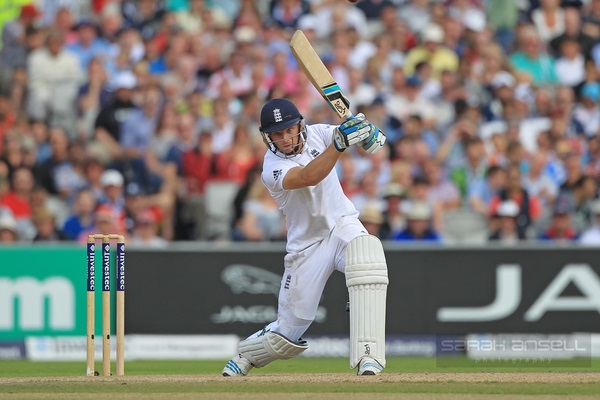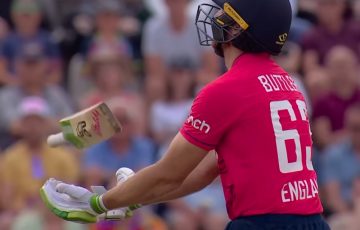Let’s take a look at how Test teams are picked and whether runs in other formats are relevant.
We’ll begin with a quick bit of background.
A quick bit of background
Doing well at one-day cricket for England used to be a common way of getting into the Test team. Players like Paul Collingwood and Andrew Strauss did well in coloured clothing and then effectively got promoted. Somewhere along the line, things changed.
Broadly coinciding with the IPL getting bigger and more influential, cricket in England seemed to factionalise. The value of white ball runs declined as far as England Test selection went and at some point seems to have come to be seen as wholly irrelevant.
Red ball runs
There is certainly logic in picking your red ball side based on red ball performances, but it’s a question of emphasis. Practically speaking, if red ball performances are all you consider, then you’re effectively ruling out many of your most skilful cricketers.
England’s top one-day players simply don’t get to play much Championship cricket (in large part because they’re busy playing for England). We wrote about Mark Wood earlier this year, who is currently torn between two worlds, skiving off his IPL commitments to cram in a four-day game for Durham in the hope of keeping his Test place. He’s almost in limbo at the minute and at some point you feel he’ll have to prioritise one colour of ball.
The way the national side has been selected means that even those who don’t explicitly pick a format have effectively been asked to do so. Play white ball cricket if you want to play international white ball cricket and play red ball cricket if you want to play Tests. There isn’t really time to do both.
The problem for England’s Test team is that with more one-day caps up for grabs and more white ball opportunities worldwide, the short format choice is the more logical one. The Test selectors have therefore been picking from a greatly reduced pool of players. You could call it the dregs, if you were feeling unjustifiably brutal.
So Jos Buttler’s Test selection is striking
Whether you think he’ll make a good Test player or not, we’d argue that Buttler’s selection is good news as it softens the boundaries between the three different formats. We know others disagree, but it’s all cricket in our eyes and the longer the sport can remain whole, the better.
No format is an island; they lie on a continuum – so if T20 runs are inevitably worth less when trying to gauge Test ability, they are not irrelevant.
Jos Buttler has won his spot with cricket runs and the resultant implication that a whole bunch of other talented England cricketers haven’t been annexed by the white ball sides strikes us as being a broadly positive development.




There aren’t many players that are consistently good at Tests and consistently shitty in ODIs – only a few perhaps. But there are quite a few that are good in ODIs and shitty at tests. So one is forced to conclude that non-shittiness in ODIs is a necessary but not sufficient condition for a test call-up.
Are you secretly Ed Smith?
If it works, it was right. If it doesn’t, it wasn’t.
Buttler’s record suggests it won’t, but maybe it will.
It does seem odd that someone is being picked and given free licence to go do what he wants, batting at 7. Suggests an undue confidence in the six that’ll be above him, while asking an awful lot of YJB (whether he wants it or not).
I’d rather have given free reign to Vince to go out there and score attractive 20s and 30s.
On the plus side, for those from “the dregs” that feel they’ve been unfairly overlooked, as well as Buttler, there are (at least) three in the top six that are currently skating on pretty thin ice.
I’m disappointed that the remarkable similarity of Buttler’s Test record to that of Michael Bevan’s will be lost because of this, though.
Jos Buttler doesn’t average 24 with the ball.
Yet.
Interesting comparison. Is Buttler in the team then as a ‘finisher’? My understanding is that his recent run of IPL scores began when he was pushed up the order to open.
There’s actually no-one in this batting order I don’t like (not always the case) and wouldn’t like to get 100, so who do I fantasise to ‘fail’ so that Buttler has enough scope to come in at 7 and make a quick double? Must I settle for a clutch of gritty/stylish but still average-improving 50’s?
I think that is the wrong comparison. Non-shittiness in any form of cricket is a necessary but not sufficient condition for text success. The relevant question is whether you are more likely to get a good test player when picking from great ODI players, relative to good first class players.
It’s probably an answerable question if someone wants to try – take the set of players who played at least 20 ODIs before their first test and compare their career records to the average test match player. Or to be more precise restrict to people who did well in those 20 ODIs.
My intuition is that it’s more likely they do well and the reason we think they don’t is because they may not be as dominant as they were in ODIs. Consider Rohit Sharma – he averages 40 in test cricket and though he doesn’t deserve to be in the team he is hardly as bad as people make out. He just disappoints relative to his ODI career. Compare to Vince or Malan with their frankly terrible records but we are still talking about how they are promising etc etc.
Jos Buttler was Daisy’s pick for this squad, but now she’s learnt that Ed Smith is the new top selector and that he has picked Jos Buttler, she is expressing contrarian doubts and hedging her opinion on this topic.
I’m not sure what this proves about Jos Buttler’s selection, let alone KC’s well-reasoned argument, but I felt a burning desire to share the above with you. That desire is now sated.
Maybe Ed copied Daisy?
He is known for copying things.
Or was that the joke?
Was your copying the joke a joke?
I’d describe the cricket formats as more of a discrete distribution than a continuum.
They overlap. You might have three slips in a one-dayer. You can end up needing 140 off 20 overs in a Test.
A Venn diagram then?
I felt Ed’s reasoning was sound, in this case:
All the top order batsmen suck, so might as well give chance to a lower order bat, such as buttler
Trotty 4/65 today with his military dobble/filth. Pick of the Warks bowlers and got his full allocation of overs.
Surprised to see that’s not even his List A best, and he’s got a FC best of 7/39.
Criminally underused as a bowler by England!
Buttler is probably the most ‘naturally talented’ cricketer England have ever produced, alongside He Who Must Not Be Named But Probably Can Be Named Now Because It’s Been Ages And Water Under The Bridge Right Lads.
Get him in and get him batting.
Selectors need to be smarter, and captains need to know what’s what. India fielded Bumrah successfully in the SA Test tour, and Rohit detrimentally (?) so.
Proof that everyone’s right about how relevant short format form is to Tests.